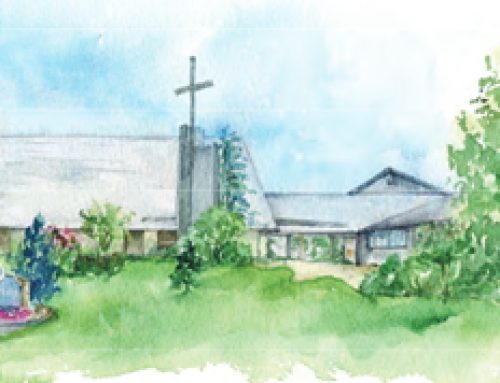FROM THE PASTOR’S DESK
My Dear Parishioners:
There’s little doubt about it: life can sometimes be hard. In my own family, my younger sister Michele, died at the age of 11 after a long illness and my maternal grandmother was widowed at the age of 40 with two young daughters. We are living in time of pandemic—not a health crisis. No matter how much we try to avoid difficulty and suffering on a day-to-day basis, whether through our attempts to live a healthy life, the material comforts we surround ourselves with, however many prayers we may say, we can’t completely ‘future proof’ ourselves against suffering. We live in a fallen and finite world, and we know that any efforts to keep ourselves from physical suffering and death are merely delaying tactics. And of course, there’s the parts of our lives that we have little control over, such as the actions of others, not to mention the forces of nature, which can cause so much damage.
We can also be our own worst enemies. We know full well that we should act to pursue things that are genuine goods; that we should make good decisions about how we think, speak, and act, and follow through with them. So often however, we chase after more limited things which cannot satisfy us. This too can bring us suffering, as it introduces fragmentation and chaos into our relationship with God and others.
I apologize if this seems a very bleak picture I have painted of our lives. However, to find a way forward, it does no harm to spell out things as they really are. There will, hopefully, also be many aspects of our lives that bring us joy amid our trials. The reason for talking about suffering is that it is that aspect of life we find hardest to deal with. When all is well, and we feel particularly blessed, life is much easier, and thank God for that.
Sadly, many Americans have developed an acute fear of speaking up about social and political issues, especially those involving race. They are worried about getting mobbed on social media, fired from their jobs, or worse. Also, critical race theorists have constructed their argument like a mousetrap. Disagreement with their program becomes irrefutable evidence of a dissenter’s “white fragility” or “unconscious bias.”
In today’s Gospel, Jesus gives the disciples a clear picture of what his future will hold. He knows what will happen to him, and he wants them to be prepared. Following him, walking alongside him, will not be easy. However, his account of what will happen to him is far too much for Peter to stomach. Jesus is the Christ, the anointed one, who has come to save his people. Peter clearly thinks that such terrible events, such suffering, should not be part of the Messiah’s lot. However, Jesus’s rebuke to Peter makes it very clear that his thinking is very much mistaken.
Christ, the anointed one, came to share in our human condition; to be like us in all things but sin. And this sharing in our human condition includes freely accepting suffering and death for our sake. By taking on these things, he is showing us the depth of his love for us, and he is completing what was necessary to save us. Through Christ’s passion and death, we learn how God holds back nothing in bringing about our salvation.
Knowing that Christ suffered in this way for us, out of love for us, should be a great help to us in our own sufferings. It is true that many times we would rather not think about the things we struggle with in our lives, or that we wish that our struggles would just disappear. But by bringing about our salvation through his passion and death, Christ makes himself close to us in the reality of our lives, and most especially in our suffering. This means that at our most isolated and vulnerable, when we are at our lowest point; whether we are there through our own doings, or whether we are sick, in pain or even dying; we know that Christ will be there in and through those sufferings.
Of course, knowing that he is there with us is an important part of how our suffering finds relief. But what we also know is that he also has the power to transform our sufferings and give us a share in his resurrection. In sharing our sufferings with him in our prayers, we find the grace we need to carry on. In the sufferings caused by our sin, he can lift the burden of our failings by his loving mercy unlocked for us in the sacrament of confession. And when we are sick or even dying, he can come to us to heal and strengthen us through the anointing of the sick. The power of his passion and death to bring us a share in his resurrection.
As Roman Catholics, we need to face the sometimes-harsh reality of our lives. But we don’t do this to be gloomy, or to make us feel bad. We do it so that we can and face it with Christ and be transformed by his love and mercy when we need it the most.
Peace,
Fr. Monteleone
To read complete bulletin click here



